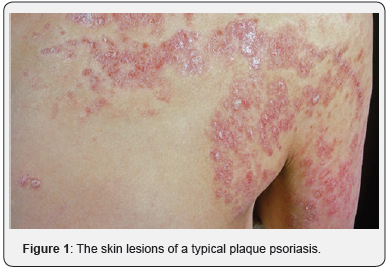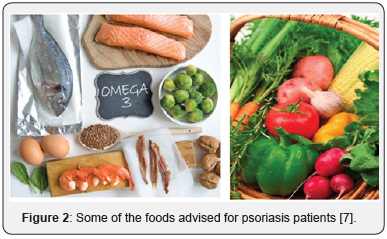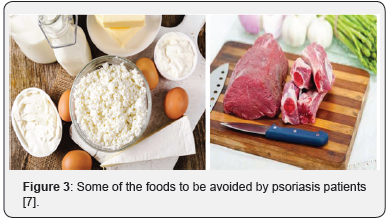Dietary and Nutritional Factors in Psoriasis
Jai S Ghosh*
Department of Biotechnology, Smt. KW College, India
Submission: June 03, 2018;Published: June 15, 2018
*Corresponding author: Dr. Jai S. Ghosh, Assistant Professor, Department of Biotechnology, Smt. K.W. College, Sangli 416416, India, Tel: +919850515620; Email: ghoshjai@gmail.com
How to cite this article: Jai S Ghosh. Dietary and Nutritional Factors in Psoriasis. Nutri Food Sci Int J. 2018; 6(5): 555699. DOI:10.19080/NFSIJ.2018.06.555699.
Abstract
Psoriasis is a skin disorder where there is large amount of keratinocytes is produced during damage repair of epidermis of the skin and it is replaced every 3 to 5 days thereby, exposing premature cells to the environment. This causes itching and pain to the patients. The disease is hereditary and is due to some abnormalities of the immune system. It has no cure but the suffering can be ameliorated both by the use of medicines (mostly topical applications) and by changing dietary habits. The patients are advised to take more cold water fishes and vegetables along with certain fruits and avoid red meat, dairy products, alcoholic beverages etc.
Keywords: Psoriasis, Keratinocytes, Fishes, Vegetables, Fruits, Diet, Nutrition, Plaque psoriasis, Guttate psoriasis, Inverse psoriasis, Pustular psoriasis, Erythrodermic psoriasis, Fattly acids
Abbreviation: EPA: Eicosapentaenoic Acid; DHA: Docosahexaenoic Acid; MHC: Major Histocompatibility Complex
Introduction
Psoriasis is an autoimmune disease. The most important characteristic feature is abnormal patches on skin which are red in color, scaly and itchy [1]. It is a condition where epidermal cells grow at a faster rate than their (dead cells) removal by sloughing [2]. Large amount of epidermal skin cells are produced say during wound repair and this excess of cells results in replacement every 3 to 5 days rather than the normal 28 to 30days [3]. It is these premature keratinocytes, which gets exposed to the environment causing the discomfort called psoriasis. This disease has a strong hereditary component and it is the cell mediated immunity of the immune system which is responsible for it, particularly the major histocompatibility complex (MHC) and the T cells [4] (Figure 1).

In fact there are five types of psoriasis viz. plaque, guttate, inverse, pustular and erythrodermic psoriasis [5]. It should be remembered that this disease can be for a certain time span or lifelong and it cannot be cured. Amelioration of pain and itches can be done only through disease management.
These lesions can get infected by bacteria or fungi very easily. Therefore, proper medication should be taken with the consultation of the physician. The patient must not go out in hot sun, should stay in a properly humidified area and apply certain steroid containing cream topically as advised by the physician.
Diet and Nutrition for Psoriatic Patients
However, the diet of such patients should also be such that it too helps in ameliorating the suffering of such patients. It is because of the uncertainty of the duration of the disease; the patient gets fed-up with the medications and tries to neglect it. It appears that these restrictions are making their life miserable. They also tend to undergo a depressed state of mind. It is at this point of time, that the food items included in the diet can help ameliorate the suffering.
Such patients must have diet which should have sufficient amount of eicosapentaenoic acid (EPA) and docosahexaenoic acid (DHA) along with ω-3 fattly acids (which is anti inflammatory) [6]. These fatty acids come from oils of fishes like salmon, herring, and mackerel. It is also present in vegetable oil like olive oil, legumes, vegetables, fruits and whole grains. The patients must stay away from alcoholic beverages, red meat, gluten containing products, highly sweetened items and dairy products since these act as triggers of the disease (Figure 2 & 3) [7].


Conclusion
Psoriasis is such a disease that the suffering of the patients can be minimized if these people are willing to switchover from their regular food habits to an altered pattern along with proper medication. It is because in more than 90 percent of the cases the disease is lifelong, strange but true.
References
- Menter A, Gottlieb A, Feldman SR, Van Voorhees AS, Leonardi CL, et al. (2008) Guidelines of care for the management of psoriasis and psoriatic arthritis: Section 1. Overview of psoriasis and guidelines of care for the treatment of psoriasis with biologics. J Am Acad Dermatol 58(5): 826-850.
- Ouyang W (2010) Distinct roles of IL-22 in human psoriasis and inflammatory bowel disease. Cytokine Growth Factor Rev 21(6): 435- 441.
- Parrish L (2012) Psoriasis: symptoms, treatments and its impact on quality of life. Br J Community Nurs 17 (11): 524, 526, 528.
- Nestle FO, Kaplan DH, Barker J (2009) Psoriasis. New England Journal of Medicine 361(5): 496-509.
- Psoriasis.
- Kaimal S, Thappa DM (2010) Diet in dermatology: revisited. Indian J Dermatol Venereol Leprol 76(2): 103-115.
- The Effects of Diet on Psoriasis.






























